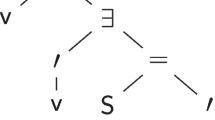Abstract
The reasoning power of human-oriented plan-based reasoning systems is primarily derived from their domain-specific problem solving knowledge. Such knowledge is, however, intrinsically incomplete. In order to model the human ability of adapting existing methods to new situations we present in this work a declarative approach for representing methods, which can be adapted by so-called meta-methods. Since the computational success of this approach relies on the existence of general and strong meta-methods, we describe several meta-methods of general interest in detail by presenting the problem solving process of two familiar classes of mathematical problems. These examples should illustrate our philosophy of proof planning as well: besides planning with a pre-defined repertory of methods, the repertory of methods evolves with experience in that new ones are created by meta-methods that modify existing ones.
Similar content being viewed by others
References
P.B. Andrews, Transforming matings into natural deduction proofs, in: Proceedings of the 5th CADE, eds. W. Bibel and R. Kowalski, Les Arcs, France, 1980 (Springer, Berlin, 1980) pp. 281–292.
C. Benzmüller, L. Cheikhrouhou, D. Fehrer, A. Fiedler, X. Huang, M. Kerber, M. Kohlhase, E. Melis, A. Meier, W. Schaarschmidt, J. Siekmann and V. Sorge, Ω: Towards a mathematical assistant, in: Proceedings of the 14th CADE, ed. W. McCune, Townsville, Australia, 1997, Lecture Notes in Artificial Intelligence 1249 (Springer, Berlin) pp. 252–255.
A. Bundy, A. Stevens, F. van Harmelen, A. Ireland and A. Smaill, Rippling: A heuristic for guiding inductive proofs, Artificial Intelligence 62 (1993) 185–253.
A. Bundy, F. van Harmelen, C. Horn and A. Smaill, The OYSTER-CLAM system, in: Proceedings of the 10th CADE, ed. M.E. Stickel, Kaiserslautern, Germany, 1990, Lecture Notes in Artificial Intelligence 449 (Springer, Berlin, 1990) pp. 647–648.
A. Church, A formulation of the simple theory of types, The Journal of Symbolic Logic 5 (1940) 56–68.
R.L. Constable et al., Implementing Mathematics with the Nuprl Proof Development System (Prentice-Hall, Englewood Cliffs, NJ, 1986).
F. Giunchiglia and P. Traverso, Program tactics and logic tactics, in: Proceedings of LPAR, ed. F. Pfenning, Kiev, Ukraine, 1994, Lecture Notes in Artificial Intelligence 822 (Springer, Berlin, 1994) pp. 16–30.
M. Gordon, R. Milner and C. Wadsworth, Edinburgh LCF: A Mechanized Logic of Computation, Lecture Notes in Computer Science 78 (Springer, Berlin, 1979).
X. Huang, Reconstructing proofs at the assertion level, in: Proceedings of the 12th CADE, ed. A. Bundy, Nancy, France, 1994, Lecture Notes in Artificial Intelligence 814 (Springer, Berlin, 1994) pp. 738–752.
X. Huang and M. Kerber, Theorem proving as an interleaving process of planning and verification, unpublished manuscript (1991).
X. Huang, M. Kerber, M. Kohlhase, E. Melis, D. Nesmith, J. Richts and J. Siekmann, Ω-MKRP: A proof development environment, in: Proceedings of the 12th CADE, ed. A. Bundy, Nancy, 1994, Lecture Notes in Artificial Intelligence 814 (Springer, Berlin, 1994) pp. 788–792.
X. Huang, M. Kerber, M. Kohlhase and J. Richts, Adapting methods to novel tasks in proof planning, in: KI-94: Advances in Artificial Intelligence–Proceedings of KI-94, 18th German Annual Conference on Artificial Intelligence, eds. B. Nebel and L. Dreschler-Fischer, Saarbrücken, Germany, 1994, Lecture Notes in Artificial Intelligence 861 (Springer, Berlin, 1994) pp. 379–390.
X. Huang, M. Kerber, J. Richts and A. Sehn, Planning mathematical proofs with methods, Journal of Information Processing and Cybernetics, EIK 30 (1994) 277–291.
A. Ireland, The use of planning critics in mechanizing inductive proofs, in: Proceedings of LPAR, ed. A. Voronkov, St. Petersburg, Russia, 1992, Lecture Notes in Artificial Intelligence 624 (Springer, Berlin, 1992) pp. 178–189.
M. Kerber, Some aspects of analogy in mathematical reasoning, in: Analogical and Inductive Inference; International Workshop AII ’89, ed. K.P. Jantke, Reinhardsbrunn Castle, GDR, October 1989, Lecture Notes in Artificial Intelligence 397 (Springer, Berlin, 1989) pp. 231–242.
M. Kerber and A. Präcklein, Using tactics to reformulate formulae for resolution theorem proving, Annals of Mathematics and Artificial Intelligence 18(2–4) (1996) 221–241.
W. McCune, Solution of the Robbins problem, Journal of Automated Reasoning 19(3) (1997) 263–276. See also http://www.mcs.anl.gov/home/mccune/ar/robbins/.
E. Melis, Representing and reformulating diagonalization methods, Technical Report CMU-CS-94-174, School of Computer Science, Carnegie Mellon University, Pittsburgh, PA (1994).
T.M. Mitchell, R.M. Keller and S.T. Kedar-Cabelli, Explanation-based generalization: A unifying view, Machine Learning 1 (1986) 47–80.
G. Pólya, How to Solve It(Princeton University Press, Princeton, NJ, 1945; Penguin Book, London, 1990).
K. VanLehn, Problem solving and cognitive skill acquisition, in: Foundations of Cognitive Science, ed. M.I. Posner (MIT Press, Cambridge, MA, 1989) chapter 14.
L. Wos, R. Overbeek, E. Lusk and J. Boyle, Automated Reasoning–Introduction and Applications (Prentice-Hall, Englewood Cliffs, NJ, 1984).
Author information
Authors and Affiliations
Rights and permissions
About this article
Cite this article
Huang, X., Kerber, M. & Cheikhrouhou, L. Adaptation of declaratively represented methods in proof planning. Annals of Mathematics and Artificial Intelligence 23, 299–320 (1998). https://doi.org/10.1023/A:1018980611571
Issue Date:
DOI: https://doi.org/10.1023/A:1018980611571




